Barcelona on the Brink
A decade ago, FC Barcelona seemed like the model club. Under Pep Guardiola, redefining how football could be played, it was about to win its third straight league title and its second Champions League title in three years. Others sought to copy its success. Yet now it faces financial meltdown, with its greatest player ever on the brink of departure and several directors battling allegations of corruption. Amid the crisis with the future of the club at stake, it has turned once again to the controversial figure whose presidency set it on the way to that last period of sustained success.
Joan Laporta has returned as Barcelona president, comfortably winning a vote conducted by more than 55,000 of the club’s members and, just like when he was elected for his first stint in charge, in 2003, he arrives in the middle of upheaval. The club has gross debts of $1.4 billion; Laporta's predecessor, Josep Bartomeu, was arrested last week; the best player in the club’s history, Lionel Messi, is out of contract at the end of June; and the club is facing another premature—by its lofty standards—exit from the UEFA Champions League, Europe’s premier club competition.
Perhaps crisis is natural. Presidents tend not to leave their posts earlier than anticipated if things are going well. But still this must feel familiar for Laporta: a deeply unpopular president ousted, debts mounting after a series of ill-conceived transfers and the club seemingly drifting from the tactical philosophy of Johan Cruyff, who was coach between 1988 and 1996 and remained in the background as a sort of guiding spirit until his death in 2016.
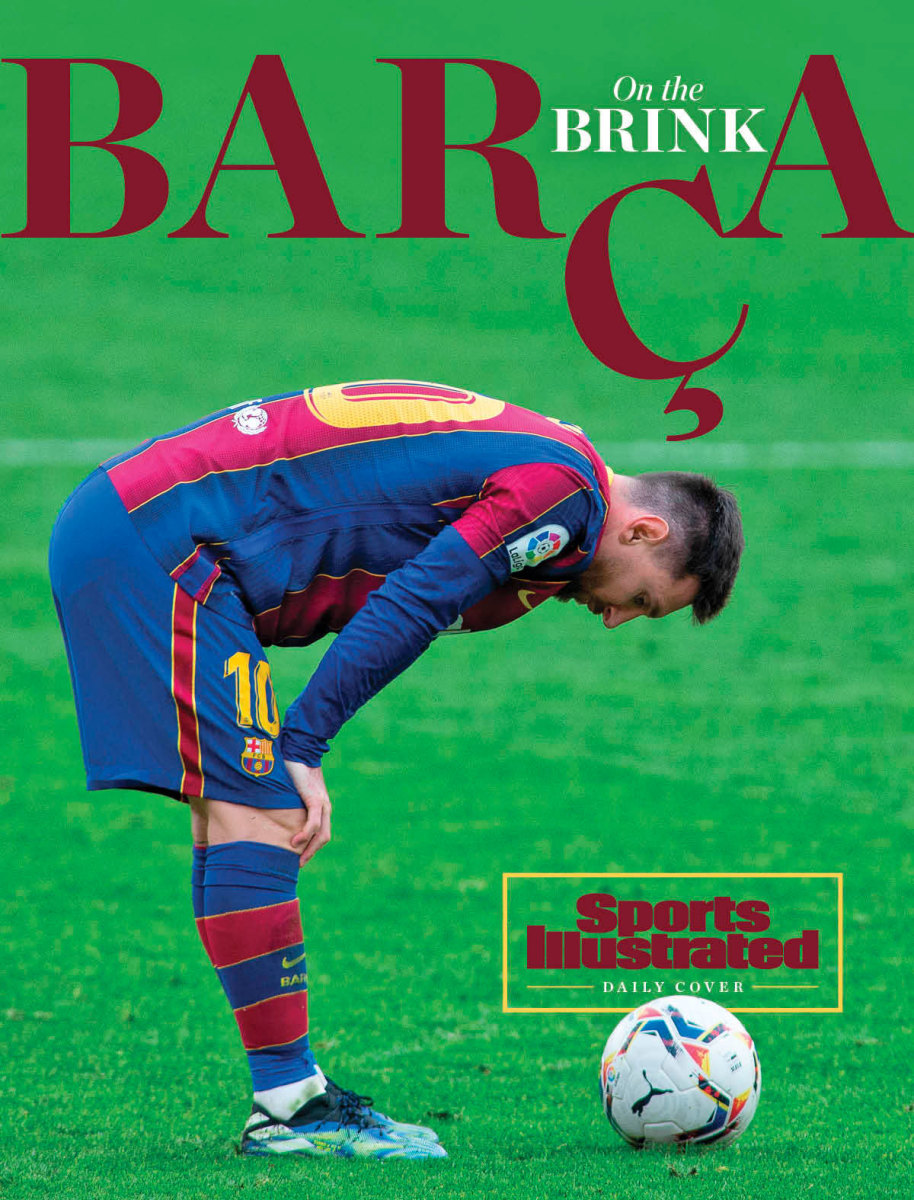
Laporta left the presidency in 2010, having been defeated in an election by his former running mate, Sandro Rosell. Two years earlier, he had lost a vote of no confidence, although not by the two-thirds majority required to force him out of the job. From the perspective of 2021, the level of dissatisfaction in his leadership looks vaguely bizarre. Admittedly, that confidence vote was held in the summer of 2008, just as manager Frank Rijkaard left the club to be replaced by Guardiola, but Barcelona was on the brink of the most successful period in its history.
Yet even the inspired decision to appoint Guardiola as manager couldn’t save Laporta, as Rosell attacked what he saw as the waste and extravagance at the club: the signing of Zlatan Ibrahimović, whose eventual sale to AC Milan came at a roughly $40 million loss; the approximately $30 million spent to sign Henrique and Keirrison, who never played; and the fortunes spent on private jets, a television channel, unused land, perfume, cigars and tickets to see Bono. Laporta left claiming Barcelona had made a profit of $14 million in his final season; Rosell had it as a $90 million loss. A decade later it all seems incredibly trivial compared to the scale of the present problems.
Back then, Barcelona was regarded as a model to follow. When Sheikh Mansour took over Manchester City in 2008, he rebuilt the club on the lines of Barcelona, even appointing two of its senior executives in Ferran Soriano and Txiki Begiristain. Nobody would copy Barcelona now.
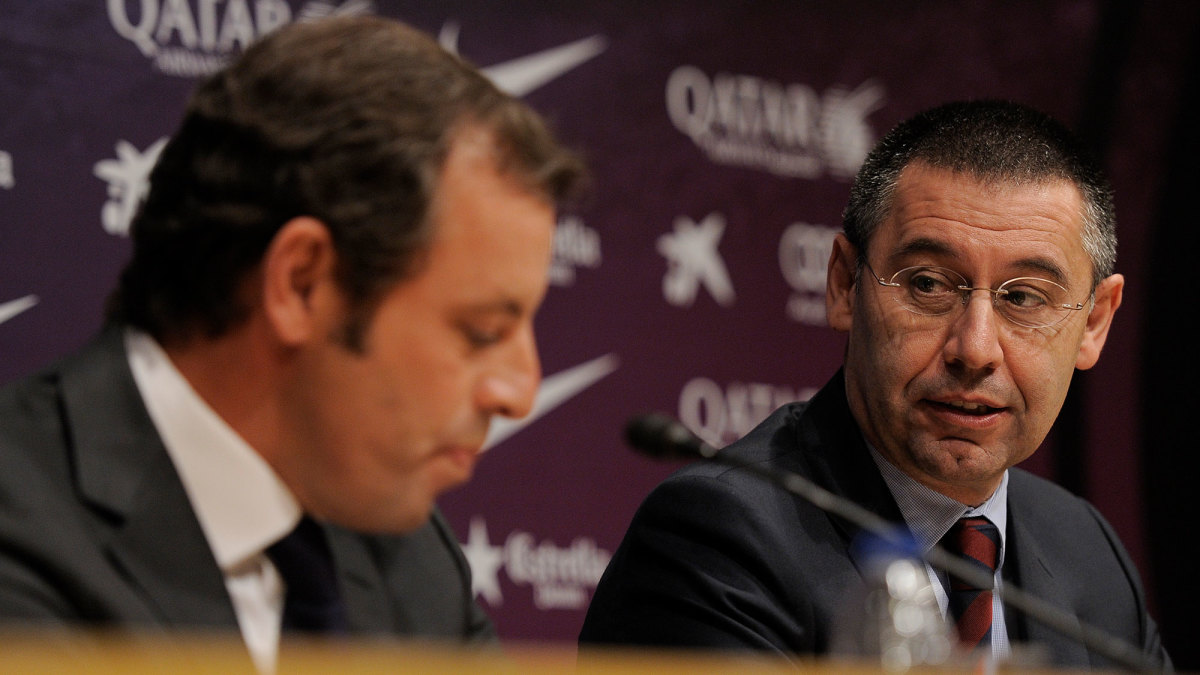
Rosell was forced to resign as president over accusations he had misappropriated funds during the signing of Neymar in 2013. He was subsequently convicted and jailed. He was succeeded by Bartomeu in elections in January 2014. Early last week, offices at Barcelona’s Camp Nou stadium were raided, documents were seized by police and Bartomeu, his advisor Jaume Masferrer, chief executive Oscar Grau and head of legal services, Román Gómez Ponti, were all detained as part of an investigation into what Catalan police called “alleged crimes related to property and socio-economic order.”
Last April, a complaint was raised by a group of club members using the name Dignitat Blaugrana over Bartomeu’s employment of I3 Ventures, a social-media-monitoring group. In seeking to protect Bartomeu’s reputation, I3 Ventures is accused of having set up sock-puppet accounts to attack his enemies, including other directors and players, Messi and Gerard Piqué among them.
In addition, it is claimed that the club overpaid for those services, and paid for them via a series of smaller payments below the threshold that would automatically trigger scrutiny by the board. When concerns were raised, the club’s own compliance unit was bypassed, and PricewaterhouseCoopers was contracted to carry out an audit. It found no evidence of corruption but did suggest protocol may have been breached in the way the payments were structured. It remains unclear exactly who owns I3 Ventures. Bartomeu, facing a vote of no confidence, resigned in October, triggering this past weekend’s election.
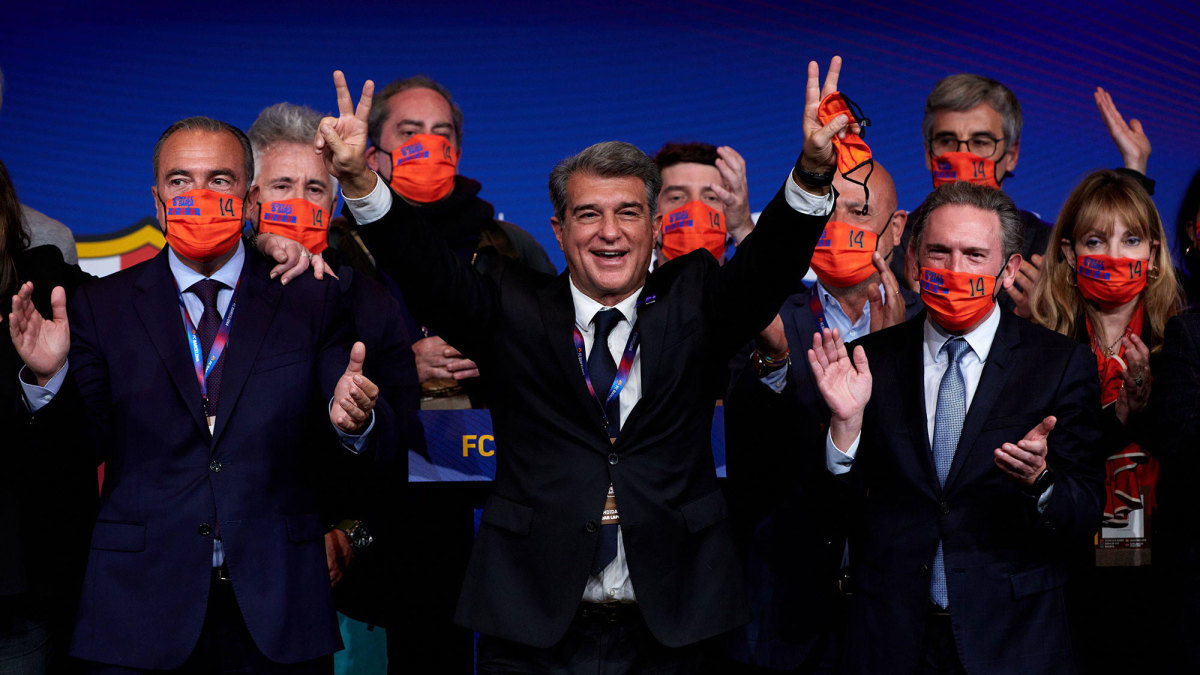
Laporta inherits a club in shambles. The most urgent issue for him is to deal with the debt, specifically short-term loans that need refinancing. In addition, the agreement reached with Goldman Sachs for the redevelopment of Camp Nou may have to be reconsidered, shabby as the stadium now appears. In the long run there will have to be retrenchment, particularly given the generally tough financial climate in global football. Barcelona’s players accepted a temporary 70% pay cut in March 2020 and conceded another $145 million in November, while around $60 million in variable payments was deferred. That staunched losses last year at $110 million, but it is not a long-term solution.
More pressing for fans, though, is the issue of Messi. On Sunday, the Argentine icon voted in a Barcelona presidential election for the first time, which many seem to have taken as a sign he is committed to the club (although he’s never previously been in the country at the right time to vote). It’s not entirely clear, though, how positive that is.
Messi is still, technically, a wonderful player. He can still do things on the field that nobody else can do. He still scores vast quantities of goals, a La Liga-leading 19 in 22 league starts this season, including 12 in his last nine, even if there was a rare five-game drought in October. To a large extent, he is the reason Barcelona is still in the title race in Spain, six points behind the leader Atlético Madrid (though they do have a head-to-head matchup still to come in May). But at the very highest level he is far less effective, perhaps even a liability.
This is one of the major issues of football’s increasingly preposterous financial structure. The past decade has seen the emergence of a cadre of superclubs that dominate their domestic leagues. According to the latest Deloitte report, Barcelona in 2019–20 had the highest annual revenue of any club in the world at €715.1 million ($850 million). It at least is challenged by Real Madrid at €691.8 million ($823 million), but the third-wealthiest Spanish club is Atlético Madrid, which lags behind at €331.8 million ($395 million). In most domestic games it is playing teams with a much smaller budget. Or to put it another way Barcelona’s de facto salary cap is more than six times greater than that of 11 of the other 19 teams in La Liga. In most league games Barcelona dominates possession and requires from Messi only a couple of moments of magic to unlock a potentially stubborn opponent.
In European competition, though, it’s different. A number of the superclubs have found their domestic domination means that they are not tactically or psychologically hardened for the challenge of playing a peer, but Barcelona, in particular, has struggled recently. Again and again in the Champions League, it has been exposed in the same way.
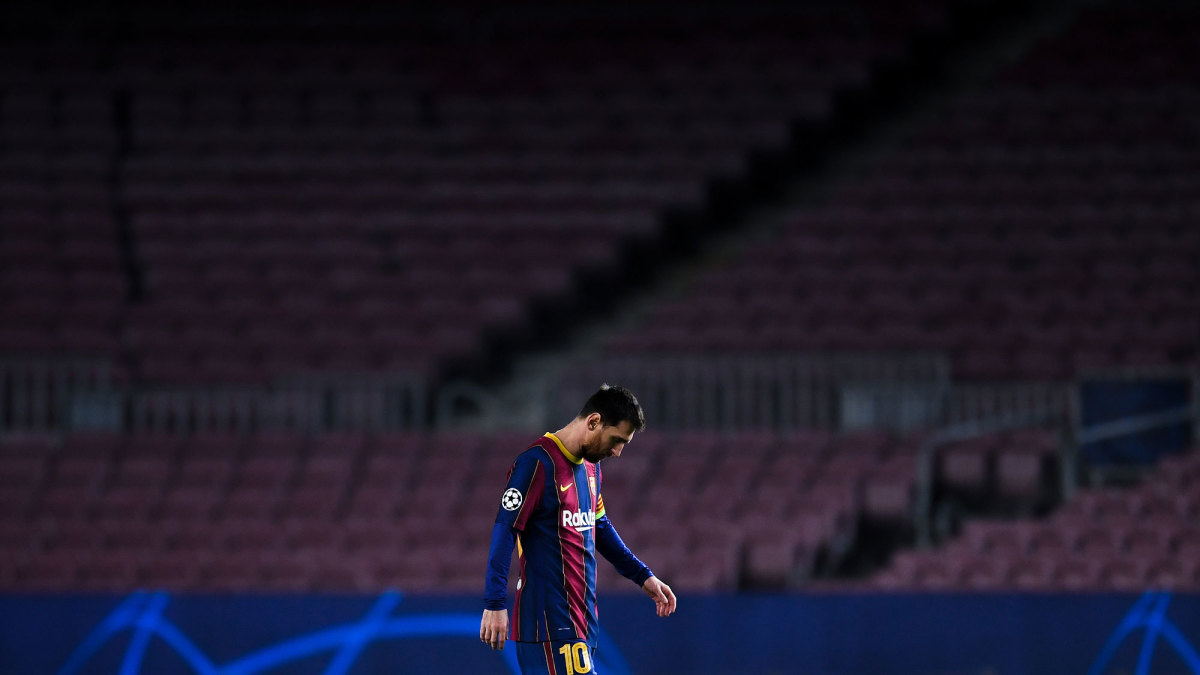
The warning signs were there in the last 16 in 2017, when it lost 4–0 at Paris Saint-Germain, although “La Remontada,” the famous 6–1 second-leg comeback, disguised the problems—at least until a 3–0 defeat at Juventus in the quarterfinals. The following year, Barcelona could have been exposed in a 1–1 draw at Chelsea in the last 16, and indeed it was when it lost 3–0 away to Roma in the quarterfinals, blowing a 4–1 aggregate lead and losing on the away-goal tiebreaker. Its midfield was slow and desperately vulnerable to sides counterattacking at pace or opponents who ran at it.
In part that was down to personnel. Ivan Rakitić and Sergio Busquets were never the quickest, and both turned 30 in 2018. But that hadn’t previously been a problem; the pair had been instrumental in Barcelona’s last Champions League success in 2015. The issue was structural, a failure of organization that left the midfield stretched, with too much ground to cover between front and back lines.
The following season, Barcelona lost 4–0 at Liverpool—again squandering a three-goal, first-leg advantage—and last summer its multitude of personnel issues culminated with an 8–2 quarterfinal to Bayern Munich in the one-off format brought on by the pandemic. Heavy defeats against top sides had become a habit, even before the 4–1 home defeat to PSG three weeks ago in the first leg of the round of 16 that put the club on the brink of an elimination commensurate with its current state of affairs. Another comeback would certainly lift spirits and renew optimism, but, like what followed the miracle of 2017, it wouldn't paper over the greater theme that has developed or the deeper issues at the club.
The dilemma for manager Ronald Koeman is clear. What should he do? Leave Messi out in big games and the furor would be enormous and perhaps so distracting as to make victory less likely. And besides, the likeliest route to victory when Barcelona is under pressure is Messi doing something brilliant (as he did in the first leg against Liverpool two years ago, when Barcelona implausibly won 3–0). But including him these days is effectively to play with 10 men without the ball.

That’s not to suggest that Messi should work harder, that he is being lazy. He is 33. He has always spent the first few minutes of games in a wandering reconnoiter of the opposition. It’s entirely possible that more running, more direct involvement in the game, would make him a less potent attacking threat. But in 2009–10, Messi regained possession through tackles and interceptions an average of 2.1 times per league game; this season that figure is down to 0.7.
The doubts are made all the more significant by the extraordinary value of Messi’s contract. In 2017 he signed a four-year deal that, according to El Mundo and its striking front page image, was worth a total of up to €555,237,619. The paradox is striking, Messi’s contract becoming like a self-fulfilling prophecy from Greek tragedy. He is frustrated by the club’s failings so he demands more money to stay, but by taking that money, he inhibits the club’s capacity to afford the players who might bring success.
Just having the money, of course, is no guarantee that it will be well spent. Barcelona’s decline really began the moment it lost Neymar to PSG in 2017. It wasn’t just that the club lost a great player—the icon who had been lined up as Messi’s successor—it was that the sale awakened all kinds of neuroses. The fee of €222 million was not just a world record but more than doubled the previous record, a progression not seen since the 1890s. Given the current financial climate, it’s a mark unlikely to be surpassed anytime soon, no matter how prolific and young the likes of Kylian Mbappé and Erling Haaland may be.
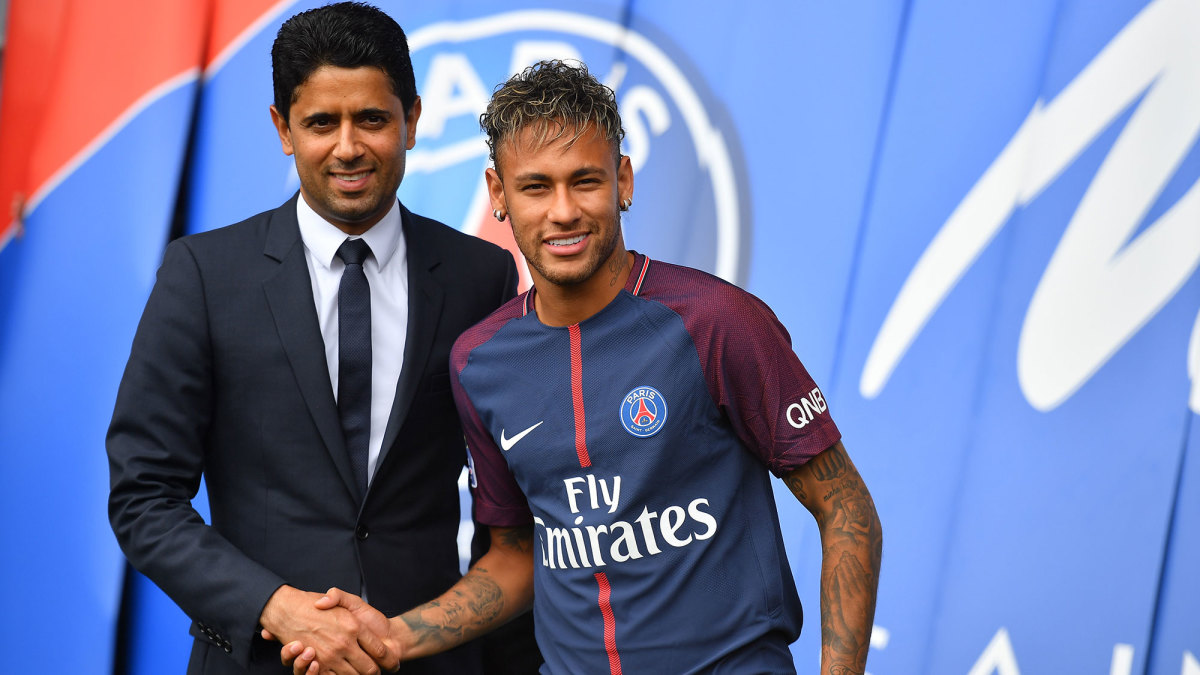
That gave Barcelona a huge amount of cash, enough to finance a rebuilding of the squad, but it also reawakened memories of the loss of Luís Figo to Real Madrid in 2000, which itself had tapped into all kinds of doubts about the status of Barcelona. If it couldn’t hold onto its key players, could it really claim to be one of the elite? At that stage it had only won one European Cup and had spent much of its history in Real Madrid’s shadow.
Neymar’s move was finalized on Aug. 3. That gave Barcelona four weeks until the transfer deadline. In retrospect it probably should have bided its time and made an informed decision, but, instead, it rushed through the signing of Borussia Dortmund’s rising French star Ousmane Dembélé for €135 million on Aug. 25. It was as though it felt it had to spend big, that it had to do something to assert itself after the embarrassment of losing Neymar, just as it had by embarking on a misguided spree after losing Figo.
Dembélé has scored just 15 league goals since, his injury-laden time at Barcelona an ongoing saga of frustration. It was his miss on a blistering counterattack in the dying moments of that 2019 first leg vs. Liverpool that wound up coming back to haunt Barcelona and kept the door open for the opponent just enough. That Messi collapsed in disbelief after it occurred, despite his team being on the precipice of a 3–0 win that should’ve been sufficient, spoke volumes.
As Dembélé struggled to settle, with almost half the Neymar money remaining and with pride still hurt, Barcelona embarked on a campaign to land Philippe Coutinho from Liverpool. He was signed for €145 million in the January window—a club record, surpassing only the fee spent on Dembélé—but it soon became apparent Barcelona had no real idea how to use him. He, too, was a disappointment and ended up loaned to Bayern Munich, for which, in a moment of crushing symbolism, he scored the final two goals in the 8–2 August humiliation.
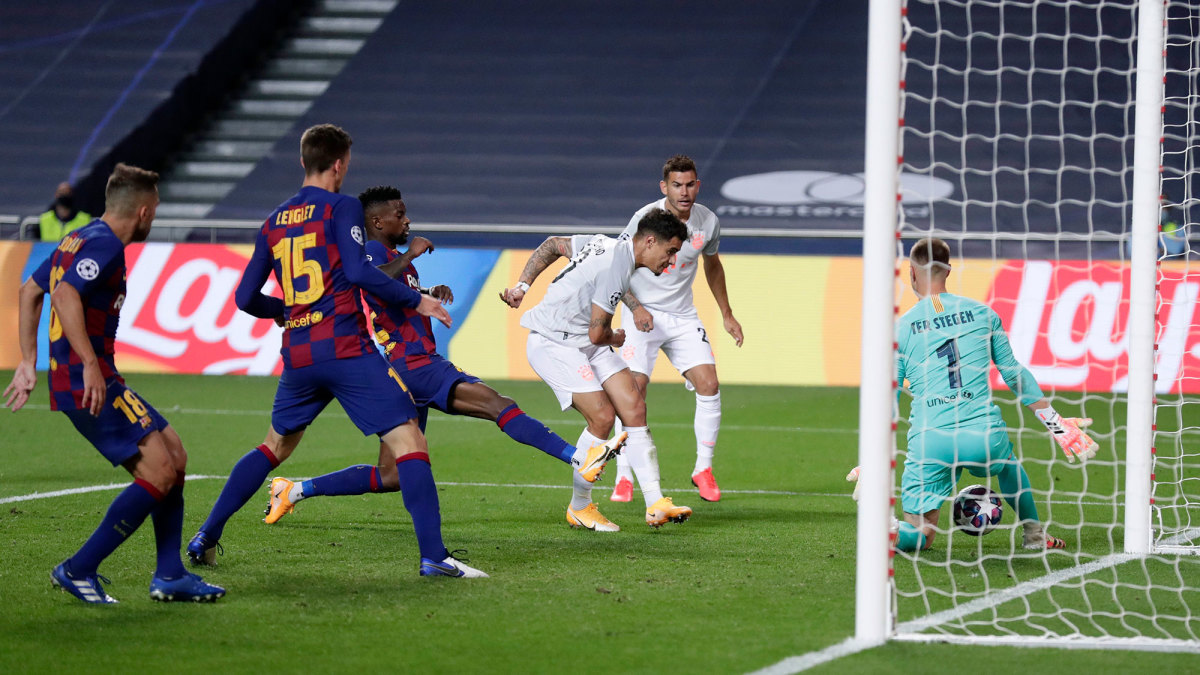
Barcelona was gifted the greatest windfall in the history of the sport and wasted it. Other recent signings, most notably Frenkie de Jong and Antoine Griezmann, have yet to consistently meet expectations. Coaches have changed with little discernible plan. In retrospect, the job Ernesto Valverde did looks remarkable, winning two league titles with admittedly less-than-spectacular football, but he was never popular at the time, and was hounded out in January of last year. Always a bridge and less of a long-term solution, Quique Setién never commanded respect. Koeman, the current coach, perhaps has the thick skin necessary to enact the necessary changes, but he was always cursed by the knowledge that the presidential elections could lead to him being replaced, no matter the changes he was able to enact on the pitch.
Laporta has given no indication as of yet whether he will retain Koeman, whose contract runs through next season. Form has improved recently with a last-minute equalizer and subsequent extra-time win in the second leg of the Copa del Rey semifinals overturning a 2–0 first-leg deficit to Sevilla. A 16-game unbeaten run in league play (13-0-3) has kept Barcelona in the mix, after a stretch of eight games between October and December that saw the club win just twice (2-4-2). Much may depend on whether the league title can somehow be purloined. Victor Font, who came second in the election, had promised to appoint Xavi, the midfield kingpin of Guardiola’s great sides who is currently coach of Al Sadd in Qatar. Font had also indicated a desire to install Jordi Cruyff, Johan’s son, as sporting director but refused to give a specific endorsement.
Although Koeman played under Johan Cruyff at Barcelona, scoring the winning goal in the 1992 European Cup final, he is not as devoted to Cruyffian ideals as many former Barcelona players and Dutchmen his age. He grew up at PSV rather than Ajax, the true home of the philosophy, while his use of a back three at Feyenoord was seen by some as worryingly unorthodox. It may be that his bullish self-belief, faith in youth and refusal to slavishly follow doctrine are what Barcelona needs to return to efficiency.
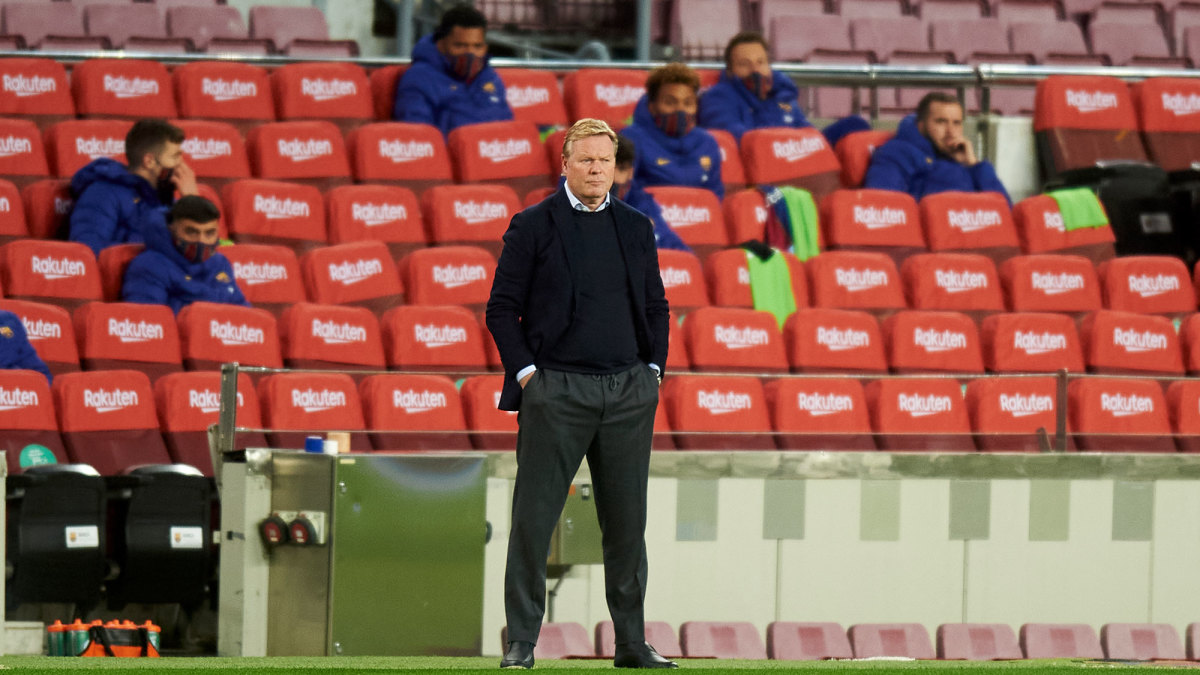
His reign, though, seems likely to be tainted by his decision to offload Luis Suárez. That immediately riled Messi, who remains so close to both Suárez and Neymar that the three have a WhatsApp group, but worse was the decision of the board to let him join Atlético Madrid. His 18 goals—second only to Messi—this season are a major reason Atlético sits atop the table. As with loaning Coutinho to Bayern, Barcelona keeps undermining itself.
It’s little wonder Messi has become increasingly disillusioned, attempting to enforce a clause in his contract that would have allowed him to leave for free last summer. Perhaps he is more settled now, invigorated by an exciting crop of young players, especially La Masia academy products like Ansu Fati and Ilaix Moriba. Maybe he is now a true believer in Koeman’s interpretation of the Cruyffian doctrine, which is more likely to be able to find compromises to accommodate him than the more fundamentalist approach of, say, Xavi. Perhaps voting in the election was a sign of a stance that has been reconsidered.
Whether Messi has a leading place in a truly elite side anymore is a different matter. If he does choose to leave—Guardiola’s Man City and Neymar’s PSG are the two connected most prominently, for reasons both financial and personal—it would perhaps offer a neat solution, slashing the club’s wage bill and also beginning the process of making the club more competitive again in Europe. But then to lose him would be to lose the goals and general brilliance that have kept Barcelona at least near the top, even as everything else has collapsed over the past couple of years. And after two decades it would be an enormous emotional wrench.
Laporta has been adamant that he can convince Messi to stay, that losing him and all he’s meant to the club and how it is projected to the world is not part of the solution. As he sits in Barcelona’s hot seat for the second time, he has, again, some extremely difficult decisions to make.
